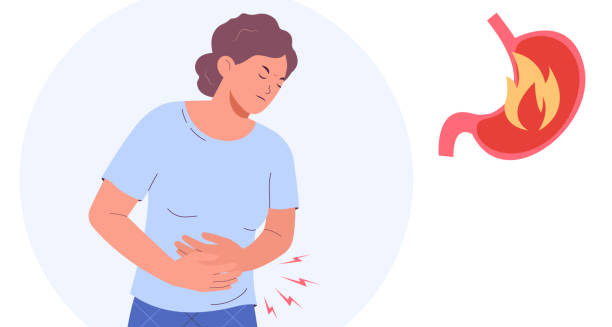Complications of Heartburn
While occasional heartburn is common and usually harmless, persistent or untreated symptoms can lead to a range of health issues. The complications of heartburn can affect not only the oesophagus but also other parts of the digestive and respiratory systems. When stomach acid frequently flows back into the oesophagus, it causes inflammation and tissue damage, which can become serious over time. Recognising and addressing the complications of heartburn early is essential for preventing irreversible harm and maintaining long-term health.
One of the most common complications is oesophagitis, or inflammation of the oesophageal lining. This condition results from repeated exposure to stomach acid and digestive enzymes. Symptoms may include increased chest pain, painful swallowing (odynophagia), and more frequent regurgitation. If left untreated, oesophagitis can cause ulcers, bleeding, and scarring. In more advanced cases, healing of the damaged tissue leads to fibrosis, which can reduce the flexibility of the oesophageal wall and impair its ability to move food efficiently.
Scarring and Inflammation
Scarring and inflammation from chronic reflux can lead to oesophageal strictures, where narrowed segments of the oesophagus form due to the healing process. These strictures cause difficulty swallowing (dysphagia), particularly for solid foods. Patients may feel as though food is stuck in their throat or chest. In severe cases, this can result in nutritional deficiencies or unintentional weight loss. Strictures often require medical procedures such as endoscopic dilation to restore the normal passage of food.
Another serious problem that can happen is Barrett’s oesophagus. In this condition, the normal lining of the oesophagus changes and starts to look more like the lining of the intestines. This change, called metaplasia, happens after the oesophagus is exposed to stomach acid for a long time. While Barrett’s oesophagus doesn’t usually cause new symptoms beyond regular heartburn, it is a warning sign. That’s because it raises the risk of oesophageal adenocarcinoma, which is a rare but very aggressive type of cancer. Because of this risk, doctors usually monitor patients with regular endoscopies and take tissue samples (biopsies) to check for early signs of abnormal cell growth.
Complications of Heartburn
Oesophageal ulcers can also develop as a result of prolonged acid contact with the oesophageal lining. These ulcers are open sores that may bleed, leading to symptoms such as vomiting blood (haematemesis) or passing black, tarry stools (melaena). Oesophageal ulcers can cause intense chest pain and are particularly dangerous if they erode into blood vessels. Treatment typically includes proton pump inhibitors (PPIs), but severe cases may require endoscopic treatment to control bleeding.
The complications of heartburn are not limited to the digestive tract. Respiratory complications are common, especially in patients who experience nocturnal reflux or silent reflux (laryngopharyngeal reflux). When acid vapours or micro-aspirations reach the throat or lungs, they can cause chronic cough, hoarseness, sore throat, and postnasal drip. In more severe cases, this may lead to asthma-like symptoms or exacerbate existing asthma. There is also evidence that reflux contributes to aspiration pneumonia, especially in older adults or those with swallowing difficulties.
Dental erosion is another lesser-known complication of frequent heartburn. Acid that reaches the mouth during regurgitation can wear away tooth enamel, leading to increased sensitivity, decay, and cosmetic changes. Unlike dietary acids, which affect only specific teeth, reflux-related erosion tends to be more generalised and harder to control without treating the underlying reflux.
Persistent heartburn may also have a significant impact on mental health and quality of life. Constant discomfort, sleep disruption, and dietary restrictions can lead to irritability, anxiety, and depression. Many individuals report decreased productivity, avoidance of social events, and relationship strain due to symptom unpredictability. The psychological burden is particularly high in people who experience heartburn during the night or who live in fear of complications such as cancer.
Complications of Heartburn
A frequently overlooked consequence of chronic heartburn is nutrient deficiency. Especially in those who rely on long-term acid-suppressing medications like PPIs. Reduced stomach acid can impair the absorption of essential nutrients such as vitamin B12, calcium, magnesium, and iron. This may lead to fatigue, muscle cramps, osteoporosis, or anaemia. Although these medications are generally safe when used appropriately. Long-term users should be monitored for potential deficiencies and advised on supplementation if needed.
In very rare cases, a condition called oesophageal perforation may occur, usually as a result of severe ulceration or injury during dilation procedures. This is a medical emergency that can cause severe chest pain, infection (mediastinitis), and life-threatening complications. Emergency surgery is typically required to repair the rupture and control the spread of infection.
Pregnant people who have severe or poorly managed heartburn may face several challenges. These include trouble sleeping, loss of appetite, and added stress on nutrition. Over time, these problems can affect both the mother’s health and the baby’s development. However, the good news is that serious complications during pregnancy are rare. When symptoms are treated early with safe remedies and healthy lifestyle changes, most cases improve quickly and safely.
The complications of heartburn also extend into the realm of misdiagnosis. Because heartburn often presents as chest discomfort. It can be confused with cardiac conditions like angina or even myocardial infarction (heart attack). This overlap in symptoms can lead to delayed treatment of heart disease or, conversely. Unnecessary anxiety in patients with benign reflux. Clinicians must remain vigilant in differentiating between these conditions, often using ECGs, blood tests, and imaging to rule out cardiac causes before settling on a reflux diagnosis.
Complications of Heartburn
In summary, the complications of heartburn include a range of structural, functional, respiratory, dental, and psychological issues. While occasional episodes are generally harmless, persistent heartburn should never be ignored. Early diagnosis, lifestyle changes, appropriate medication use, and regular monitoring can prevent or greatly reduce the risk of complications. If symptoms worsen or fail to respond to standard treatments, prompt evaluation by a healthcare provider is essential to protect long-term health and quality of life.


